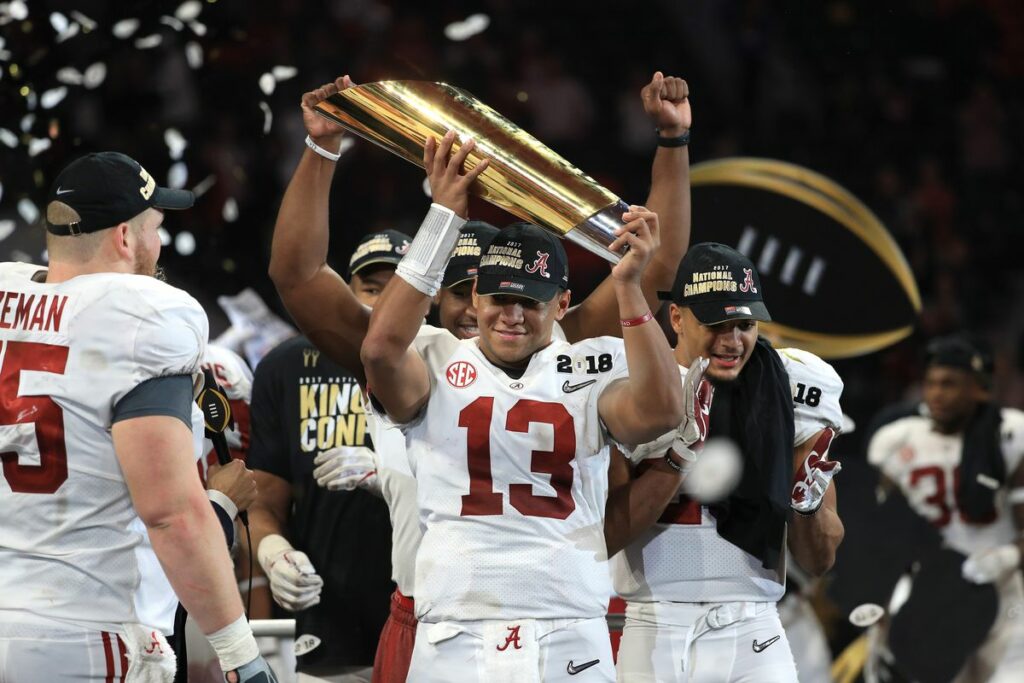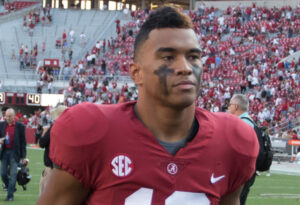It was either late Monday night or early Tuesday morning. I do not remember which. I was more focused on the situation than the time. I found myself sitting on the coach in my basement in fervent prayer. I was praying, by name, for Andy Pappanostas and JK Scott. I did not know the name of their long snapper but I was praying for him, too. The Alabama Crimson Tide had possession of the football in Georgia Bulldog territory as the final seconds of the 2017 College Football Playoff National Championship game were ticking away. The game was tied and all Alabama needed to complete an improbable comeback and win a fifth national championship in nine years was for the long snapper to make a good snap, JK Scott to make a clean hold, and Andy Pappanostos to make a straight ahead 36-yard field goal. Such a kick was well within the range of almost every college place kicker, including Andy Pappanostas. Pappanostas choked. He missed the kick wide left as time expired. It wasn’t even close. Despite my prayers for Andy Pappanostas, Alabama and Georgia went to overtime.
After this miss, I thought for sure Alabama was going to lose, given that UGA’s kicker, Rodrigo Blankenship, has ice-water in his veins and is one of the best kicker’s in the country. Yet, Alabama did not lose. After Blankenship made a clutch 51-yard field goal in overtime to put the Dawgs ahead, Tua Tagovailoa retook the field. Tagovailoa, the Tide’s true freshman backup quarterback, had come into the the game at halftime to replace an ineffective Jalen Hurts. Down by 13 points, Tagovailoa, after not having taken a meaningful in-game snap all season and being plunged into the pressure-cooker of the biggest arena in college football, had already led the Tide to what is being hailed as a “miracle comeback.” On Alabama’s first offensive snap of overtime, no one was open. Tagovailoa should have thrown the ball away but instead he tried to scramble away from pressure and ended up taking a 16-yard sack. It was second down and a mile. A first down seemed improbable. Even if Alabama got some yards back on the ensuing plays, Pappanostas could not be depended upon to make a kick to tie the game. The Tide, it seemed, was doomed. On the Tide’s next play, Tagovailoa became an Alabama football legend. On a play called “Seattle,” the young quarterback looked off Georgia’s safety Dominick Sanders, turned his head quickly to the left, and then threw a perfect dart to a streaking freshman receiver named DeVonta Smith. Having blown by Georgia cornerback Malkom Parrish, Smith was wide open. He caught Tagovailoa’s pass in stride and scored a game-winning touchdown.
For a moment I sat in stunned silence, in near-disbelief of what I just witnessed and waiting to see if there was a flag on the play. There wasn’t and what I saw really happened. I burst out of my basement door, barefoot and running as fast as I could into the street, screaming “Praise Jesus, Praise Jesus, Praise Jesus, Roll Tide! Roll Tide!” into the cool night air. I do not know how many of my neighbors I woke up. I don’t usually get that excited. I’m pretty sure God isn’t overly concerned with who wins football games…but I sure am. I am a lifelong, die-hard Alabama fan. A psychologist recently analyzed me. Her report read, “Mr. Dunn exhibited some unusually excessive interest in specific topics (e.g. Alabama football)…” I love the Tide. I even pray for them to do well. As it turns out, I wasn’t the only one praying during the game. Tua Tagovailoa was praying, too.
Tua Tagovailoa arrived in Tuscaloosa as highly touted recruit from Hawaii, an elite high school quarterback. He chose the University of Alabama from among a number of other big time schools who had offered him a scholarship to play football. Though Tagovailoa saw limited playing time during the seasons, there were two things every Alabama fan knew about him when he took the field in the 2nd half: (1) he can really sling the football and (2) he is very religious. He paints his eye black into the shape of the cross. He’s been called the “Tim Tebow of Hawaii.” When he came to campus for recruiting visits; he attended church with Nick Saban. The religiosity of Saban and the state of Alabama as a whole influenced his decision to come and play for the Crimson Tide. When interviewed immediately after the end of game on ESPN, Tua Tagovailoa didn’t pass up a chance to publicly praise God:
“First and foremost, I’d just like to thank my Lord and Savior, Jesus Christ. With him, all things are possible. That’s what happened tonight.”
Christian media outlets jumped at the chance to highlight the fact that a prominent football star was giving God all the credit in his big moment. For example, the Christian Index ran a story entitled “Two Freshman Quarterbacks Giving Credit Where Credit is Due.” Index staff writer Scott Barkely wrote:
In the hours after last night’s National Championship game, we saw examples from two quarterbacks who far exceed the title of “freshman.” Alabama quarterback Tua Tagovailoa …thanked Jesus Christ, his Lord and Savior. It’s nothing new for athletes to credit God after a big win. But let’s be honest, sometimes those shout-outs seem less-than-genuine when stories creep out regarding their personal lives. And given the platform athletes receive, a genuine witness becomes even more important… (Georgia Quarterback Jake Fromm’s) family has strong faith roots at Southside Baptist in Warner Robins, an Independent Baptist church, as well as an endearing relationship with Pastor Jerry Walls, a die-hard Bama fan. As such, Fromm is quick to talk about Jesus and his relationship with God.”
Fromm trusted God in his defeat. Tagovailoa trusted God in his victory. Barkley is right to point out the importance of a platform and a genuine personal life to back up a Christian testimony. By all accounts, Tua Tagovailoa is a polite, centered, peaceful, and moral young man. However, should he propped up as an example of virtue in Christian media? Not knowing where Tua went to church (other than visiting Nick Saban’s Catholic Church), I wasn’t so sure, even after hearing him thank Jesus on the big stage. Having researched the matter, I have found that Tagovailoa is a member of Message of Peace Church in Ewa Beach, Hawaii. The church is a member of the Hawaii Conference of the United Church of Christ. I know little of this denomination but it does fall within Trinitarian orthodoxy. However, I’m convinced that Tua Tagovailoa is not someone to be looked to as a hero of Christianity. As it turns out, he’s a charismatic. When interviewed about how he stayed poised in a high-pressure situation, Tagovailoa shared the following statement:
“I was praying. I was speaking in tongues. It kept me calm. I would say my poise comes from my faith. I just pray for peace.”
I’ll not dispute that Tagovaioa’s prayers for peace were answered (nor did his natural talent, confidence, and practice time go to waste). However, it’s alarming that the “Tim Tebow” of Hawaii engages in the contra-biblical modern-day charismatic practice of talking in tongues. From a biblical standpoint, “speaking in tongues” means to speak in another intelligible, extant language. The biblical Greek word λῶσσα when used in the context of speaking refers to “the language or dialect used by a particular people distinct from that of other nations.” It does not refer to the gibberish spewed out by adherents of the modern day post-Asuza charismatic movement. It is unfortunate that such a pious young man as Tua Tagovailoa has been taught this errant belief. I certainly don’t expect a 19-year old quarterback to know any much more theology than what he’s been taught at his local church and Tagovailoa is getting attention for doing the right thing, thanking God. However, his admission of using “tongues” presents parents with an opportunity to explain to the thousands of young people who now look up to Tagovailoa that the modern charismatic practice of “speaking in tongues” is a serious error, one which is no doubt offensive to the Holy Spirit. Christian celebrity is dangerous to be sure. There’s no doubt that Tua Tagovailoa is a better behavioral role model than the Alabama players who were using profanity and playing with poor sportsmanship during and after the game (I’m looking at you Bo Scarborough and Mekhi Brown). Tagovailoa seems like a hardworking true sportsman and genuinely polite young man. However, bible-believing Christians don’t need to make heroes out of charismatics just because they thank Jesus on TV. The Church needs charismatics off of TV.
Superstar athletes or not, we can all thank Jesus in the King’s English. Hopefully, everyone reading this who is not a Christian will consider repenting of their sins and submitting to the risen Christ as the Lord of their lives. As for me, I’ve already done that and, if the Lord blesses me with another child, I’ll probably still name him Tua.
Roll Tide.
*Please note that the preceding is my personal opinion. It is not necessarily the opinion of any entity by which I am employed, any church at which I am a member, any church which I attend, or the educational institution at which I am enrolled. Any copyrighted material displayed or referenced is done under the doctrine of fair use.













